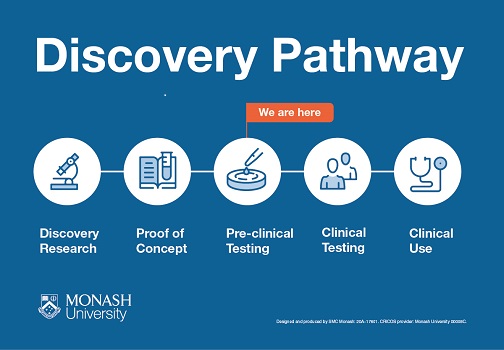PHILANTHROPIC DONATION ENABLES COVID-19 RESEARCH STUDY TO MOVE INTO THE PRE-CLINICAL PHASE
A philanthropic donation from The Leona M. and Harry B. Helmsley Charitable Trust to Monash University will fully fund the important next steps in research on the use of the FDA approved, anti-parasitic drug Ivermectin to combat COVID-19.
Helmsley’s donation will enable the study, led by Monash Biomedicine Discovery Institute’s Dr Kylie Wagstaff in collaboration with the Peter Doherty Institute of Infection and Immunity (Doherty Institute), a joint venture of the University of Melbourne and Royal Melbourne Hospital, to move from the in-vitro phase to pre-clinical trials. The study’s earlier findings, published in Antiviral Research, reported the effectiveness of Ivermectin against the SARS-CoV-2 virus in cell culture.
This next crucial phase will allow for extensive work to be done in the laboratory around safe and effective dosage optimisation. If the pre-clinical laboratory-based trials are successful, Helmsley will immediately fund patient trials.
Dr Wagstaff said they were incredibly thankful to Helmsley for supporting this important work through to the next phase. In times of crisis when time means lives, it is particularly important to move quickly, she said. Philanthropic funding can be delivered quickly to the point of need so that breakthroughs and answers can be achieved with the speed that is needed to save lives around the world.
“We are conducting a range of optimisation experiments that, if positive, will determine the best dosage and treatment regimen to move forward into clinical trials. Our research will be significantly accelerated as a result of this generous contribution,” Dr Wagstaff said.
The Leona M. and Harry B. Helmsley Charitable Trust is one of the top 15 largest U.S. foundations and grants more than $250 million annually (over $2.5 billion since 2008). Helmsley aspires to improve lives by supporting exceptional efforts in the U.S. and around the world in health and select place-based initiatives.
“Medical advances are a critical part of the path out of the global COVID-19 crisis, and we need as many options as possible. The in vitro results of Ivermectin are especially encouraging given how inexpensive and accessible the drug is everywhere in the world,” said Walter Panzirer, a Trustee at the Helmsley Charitable Trust.
“At Helmsley, we pride ourselves on moving quickly, and providing support that others cannot, which often includes early stage clinical efforts like this Ivermectin dose optimisation study. If Dr Wagstaff’s research ultimately yields positive results, Ivermectin could become the great equaliser and life-saver in fighting COVID-19, like it’s been for other devastating conditions.”
The discovery of Ivermectin won a Nobel Prize in 2015 for its impact around the world as an anti-parasitic drug, providing humankind with a powerful new means to combat debilitating diseases such as River Blindness, Lymphatic Filariasis and significantly reduce the mortality rates for patients suffering from Malaria. The consequences in terms of improved human health and reduced suffering are immeasurable.
About the Monash Biomedicine Discovery Institute at Monash University
Committed to making the discoveries that will relieve the future burden of disease, the newly established Monash Biomedicine Discovery Institute at Monash University brings together more than 120 internationally-renowned research teams. Our researchers are supported by world-class technology and infrastructure, and partner with industry, clinicians and researchers internationally to enhance lives through discovery.Visit our website for the latest COVID-19 news, experts and projects.

